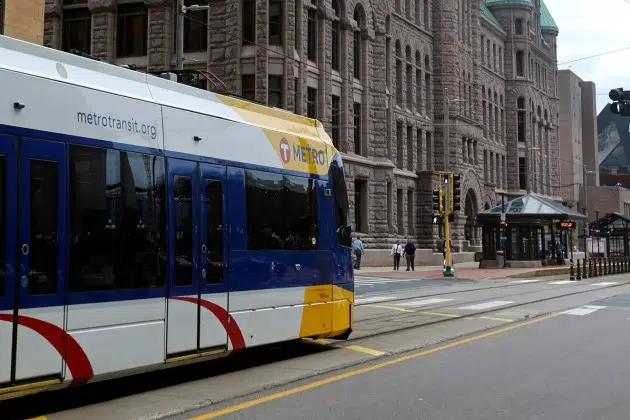ST. PAUL, Minn. (AP) — The Metropolitan Council put itself on the hook for huge cost overruns on the Southwest Light Rail Transit project even though it didn’t have the money, and it failed to develop a contingency plan to find the funding, the Office of the Legislative Auditor said Wednesday.
In a sharply critical report, the nonpartisan auditor’s office also said the regional governing agency has not been fully transparent about the snowballing costs and delays on the project.
Back before construction started in 2019, the Met Council estimated the 14.5-mile light rail line from downtown Minneapolis to suburban Eden Prairie would cost just over $2 billion and open in 2023. The council now estimates that that the line won’t start running until 2027 and that costs will reach nearly $2.8 billion, making it one of the most expensive public works projects in Minnesota history.
Even before construction started, the Federal Transit Administration raised concerns about the council’s ability to cover unexpected cost overruns, the report said. By early 2022, the council’s obligations exceeded the funds it had committed to the project.
“The Council did not have enough funds to finish the project, and it also did not have enough funds to halt the project,” the report said.
The council has not determined where it will get the additional $650 million to $750 million it needs to complete the line and put it into service. The report is unlikely to make that job easier. It only fueled bipartisan criticism of the project.
“Not another penny of state money should be spent on Southwest Light Rail. That should go without saying,” Sen. John Jasinski, of Faribault, the lead Republican on the Senate Transportation Committee, said in a statement. “We have no confidence in the Metropolitan Council to properly manage or complete the project, let alone to do so with any fiscal prudence or at any value to the taxpayers.”
Most of the overruns are connected with a half-mile tunnel in the Kenilworth neighborhood of Minneapolis that was meant to avoid conflicts with existing freight rail traffic, and pedestrian and bicycle traffic in the narrow corridor of available land between two lakes. Serious groundwater and soil issues later emerged, and a condominium complex has sustained damage blamed on construction.
The evaluation released Wednesday focused on decision-making by the unelected Metropolitan Council, whose 17 board members are appointed by the governor. The auditor plans to release a second evaluation this spring that focuses on the council’s oversight of contractors and its processes for controlling costs. The office is also conducting a financial audit of the project.
Legislative Auditor Judy Randall and her staff recommended several improvements, including that the Legislature require the council to also bear some responsibility for cost overruns, since it is overseeing the light-rail construction.
Charles Zelle, who chairs the council, agreed with that recommendation, but pushed back against much of the report. He wrote in a formal response that the report “minimizes the Met Council’s transparency and accountability to our funding partners.”
The chairman also disputed the auditor’s conclusion that cost overruns have been “far greater” than those experienced by most comparable major projects nationwide. He wrote that the data in the report shows the project is “more cost-effective per track mile than other projects of varying size.”
Zelle got a skeptical reception when he appeared before the Legislative Audit Commission as it reviewed the report. Democratic Sen. Scott Dibble and Rep. Frank Hornstein, whose districts include the Kenilworth corridor and the condos, backed up the auditors’ complaints about trouble getting information from the council. Both advocate making it an elected body to make it more accountable.
“We can rail at the Met Council, but the Met Council is very predictable,” Dibble said. “It defended everything that they do and how they do it. … There’s no way to affect the direction or the decision-making of this entity because it’s so far removed from the public.”
(Copyright 2023 The Associated Press. All rights reserved. This material may not be published, broadcast, rewritten or redistributed.)
Latest News







